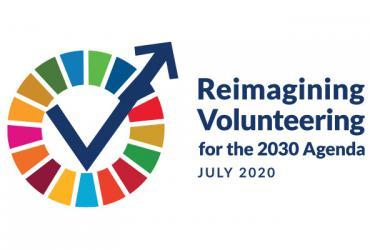
https://www.unv.org/planofaction
About the Plan of Action
The Plan of Action to integrate volunteering into the 2030 Agenda was developed together with volunteer-involving
Action developed and organizations, civil society organizations, private sector, academia, UN agencies and UN Member States.
Adopted by the UNGeneral Assembly (UNGA) in 2015, the Resolution on “Integrating volunteering in peace and development: the Plan of
Action for the next decade and beyond” (A/RES/70/129) provides a global framework through which stakeholders can
support and leverage the potential of volunteerism to deepen civic engagement and sustainable development outcomes.
The UNGA resolution that followed in 2018 (A/RES/73/140) encouraged Member States to increasingly cooperate with other
volunteering stakeholders to further integrate volunteerism into national development strategies; include information on
the impact of volunteerism in Voluntary National Reviews (VNRs) of the SDGs; and called for national-level analysis on
volunteering as inputs for regional consultations on volunteering in 2019, to be held in the context of the
annual Regional Forums on Sustainable Development.
How is the Plan of Action implemented?
The implementation mechanisms for the Plan of Action are set out in the Report of the Secretary General on the Plan of
Action. These include the preparation of country level analysis with the aim of ensuring that these National Situation Analysis
(NSA) inform and be part of the Voluntary National Review (VNR) reports on progress towards the SDGs. The NSAs will inform
the Regional Synthesis Reports which will be presented at the Regional Consultations coinciding with the
annual Regional Forums on Sustainable Development. Finally, a Global Synthesis Report will be developed for the Global
Technical Meeting in 2020 (GTM2020).
To complement these inter-governmental implementation mechanisms, civil society,
academia and the private sector and especially volunteer involving organizations are encouraged to use all existing fora and
processes to increase consultations and document trends, evidence, best practices and lessons learnt. These will serve as
inputs to the GTM2020 and the Global Synthesis Report.
What will happen at the Global Technical Meeting 2020?
The theme of the 2020 Global Technical Meeting will be “Reimagining Volunteerism for the 2030 Agenda”. It will focus
on sharing lessons learnt with a view to informing a debate on the evolving nature of volunteerism in the face of more
complex global challenges; and the adjustments required to further improve the practices, contributions and impact of the
global volunteer movement to peace and development and the achievement of the SDGs between 2021 and 2030.
The outcomes of the GTM2020 will help set the roadmap on the reimagining of volunteering in the context of the 2030 Agenda.
Generating analysis, evidence and knowledge sharing on how volunteerism has been and is contributing to the
Why is an evidence based approach the cornerstone of the Plan of Action?
The implementation of the 2030 Agenda is a critical component to effectively scale up the impact of volunteering in the 2030
Agenda. This entails: reviewing the role of volunteerism, particularly in the process of localizing and achieving the
Sustainable Development Goals (SDGs); and creating a knowledge base that is inclusive of good practices, lessons learnt
and data sets on volunteering for the SDGs.
What are the key focus areas of the consultations leading to the GTM2020?
The Global Volunteer Community including governments, UN Agencies, civil society, academia and the private sector and
especially volunteer involving organizations has an important role in collecting and validating evidence in the lead up to
the GTM 2020, particularly on the role of volunteerism in improving data availability for Agenda 2030; on measures which
can be taken to make volunteerism more effective as a modality and mechanism to help achieve the SDGs; and on key
Agenda 2030 policy areas through which policymakers and Plan of Action stakeholders can prioritize volunteers as powerful
SDG accelerators.
Some relevant policy areas to look at include inequality, social inclusion, demographic changes, gender,
climate change, safety and security of volunteers, role of volunteering in the SDG localisation process, South-South
cooperation, and impact measurement.
How is the Plan of Action coordinated?
The GTM2020 Secretariat is co-chaired by the International Federation of Red Cross and Red Crescent Societies
(IFRC) and UNV. A technical working group provides strategic direction to the process. The Plan of Action Secretariat is
hosted at UNV. Its main role is to coordinate the implementation of the Plan of Action to integrate volunteering into the 2030
Agenda, including co-organizing the GTM2020.
Where can I find more information?
Visit the Plan of Action website www.unv.org/planofaction . Contact the Plan of Action Secretariat at unv.poa@unv.org or
your national UN Volunteers focal point for further information.










Add new comment